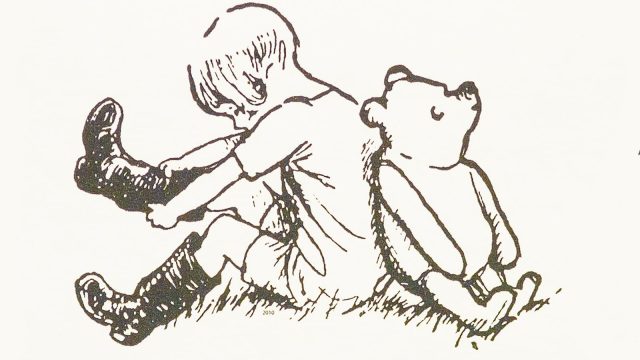Let’s clarify the Winnie-the-Pooh situation right off the bat, because it’s important to get the facts sorted. “Teddy Bear” was initially published in When We Were Very Young, one of the many works to enter the public domain two years ago. This year, the book Winnie-the-Pooh, and the illustrations thereof, enters the public domain. Therefore, the character does as well. Now We Are Six and its eleven poems were published in 1927 and enter the public domain next year; The House at Pooh Corner follows in 2024. Disney’s version first appeared in theatres in 1966 and won’t be in the public domain for forty years. The play, which I was specifically asked about, was published in 1931 and therefore becomes public domain in 2027.
Now, this article is going to be about US public domain, which is about date of publication; other countries go with other standards. However, I’m in the US, as is the media industry I know best, so that’s what we’re covering here. For reasons to do with a certain mouse and a certain late recording artist and Senator, copyright in the US is 95 years after the publication date. I’m a fan of copyright as a way to support the artist, and to a certain extent any minor children after the author’s death and things like that, but 95 years is frankly ridiculous and needs to be shortened.
Anyway. Everyone I know is talking about a certain British bear. But if you’re not a fan, you might prefer The Sun Also Rises, the first novel by Ernest Hemingway. Faulkner, too, enters the public domain with his own first novel, Soldiers’ Pay. The first books of poetry by Langston Hughes and Dorothy Parker. A play about colorism by Zora Neale Hurston. Clouds of Witness, by Dorothy L. Sayers, introducing the full Wimsey family. The Murder of Roger Ackroyd, if you prefer Agatha Christie. The Seven Pillars of Wisdom, which became Lawrence of Arabia, and the original novel of Bambi. H. L. Mencken and D. H. Lawrence.
Movies? Of course we can talk movies. Murnau drew on the public domain play of Faust to create his movie version, which is now in the public domain in the US. Films by Harold Lloyd and Buster Keaton are going into the public domain, for fans of silent comedy. If drama is more your speed, there’s the classic The Son of the Sheik, one of Valentino’s hits, and The Temptress, starring Greta Garbo. If you want to explore the root of all those rip-off low-budget fairy tale adaptations that people give others instead of the Disney, there’s The Cohens and Kellys, over which a lawsuit was filed that determined that stock characters can’t be copyrighted.
Music? Okay, we’ll start with composition before getting to the wider change. If your red, red robin is bob bob bobbin’ along, you can sing about it without paying for the rights. Similarly, you can sing bye bye to your blackbird. If you’re lonesome tonight, you can sing it, though you can’t yet avoid the Presley estate if you play that version. If you know Susie, you can sing that, too—though I’m not sure why it’s on this year’s list, as its copyright date appears to be December 31, 1925.
Even better, an estimated 200,000 sound recordings are being released into the public domain. Everything recorded before 1923. This includes works by Sophie Tucker and Ethel Waters. Mamie Smith and her Jazz Hounds. Al Jolson. Enrico Caruso, Pablo Casals, and Sergei Rachmaninoff. The Sousa Band and Fanny Brice. A trove of century-old recordings are available freely now for the first time. The first recording of “Swing Low, Sweet Chariot.” A wealth of material that’s valuable to marginalized communities but hasn’t really paid off for copyright holders in ages.
Because that’s the thing. Sure, some of these are valuable properties. But who are they paying? Valentino had no children and died so long ago that Son of the Shiek is the last of his movies to be in the public domain. The estate of Dorothy L. Sayers is its own story, but I have no idea who currently holds the rights and benefits from the copyright. One of Felix Salten’s children died before he did, and the other died in 1977; I don’t know who holds his rights, either. Frankly, I’m not sure the Hemingway family needs the money at this point.
I’m not an expert, and I don’t know where the tipping point is at which a copyright becomes more a drain than a benefit. Extended copyright makes works disappear; it’s well established. If you can’t access them, and there’s no interest in them, people forget about them. Many of these are so-called “orphan copyrights,” where it’s impossible to work out just who does own the rights, so the copyright isn’t protecting anyone at all. I’d argue that we need a law that establishes that, once that situation is in place, the copyright should expire. But then, I also think we need to standardize copyright worldwide and limit it to a much shorter span than it is now.
Benefit me for writing this column by supporting my Patreon or Ko-fi!

